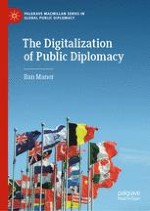2019 | OriginalPaper | Buchkapitel
10. A Discussion of the Digitalization of Public Diplomacy
verfasst von : Ilan Manor
Erschienen in: The Digitalization of Public Diplomacy
Verlag: Springer International Publishing
Aktivieren Sie unsere intelligente Suche, um passende Fachinhalte oder Patente zu finden.
Wählen Sie Textabschnitte aus um mit Künstlicher Intelligenz passenden Patente zu finden. powered by
Markieren Sie Textabschnitte, um KI-gestützt weitere passende Inhalte zu finden. powered by
